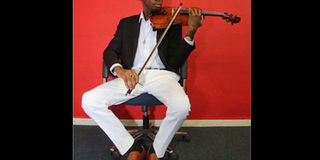A violin is like a jealous lover

Violinist Chilumo Mbwana. PHOTO| KANYIRI WAHITO
What you need to know:
- Three years later, the bug that Mbwana, 23, had caught, was growing stronger. In 2012, he joined Kenya Conservatoire of Music, a leading music school in Kenya, hoping to learn more from veteran violinists.
- As a fulltime musician, my livelihood depends on music. I perform at weddings and other occasions such as the Valentine’s Day and at private parties. I mostly have two gigs a week, mostly in Mombasa, Nairobi or Nakuru.
- We don’t have many institutions that teach music exclusively; only a few academies offer music lessons. Most universities teach music as a unit within a bigger course.
In 2009, a visiting South Korean musician performed a Hungarian classical folk piece of music by Johannes Brahms at Alliance Boys High School. Chilumo Mbwana, then a Form Three student, was in the audience. It was his first time to see a violin being played, an experience he describes as mind-blowing and love at first sight.
Three years later, the bug that Mbwana, 23, had caught, was growing stronger. In 2012, he joined Kenya Conservatoire of Music, a leading music school in Kenya, hoping to learn more from veteran violinists. He even bought his own violin, a second-rate instrument, for Sh10,000 – decent violin costs from Sh50,000 upwards.
At the time, he was in his third year at Kenyatta University studying Commerce, but would spend more time playing his violin than he would attending to his academic work. By then, he was clear about what he wanted to do: to be a career violinist. After graduating, he burst fully into the realm of music. Today, he is proud of his decision.
Where do you perform?
As a fulltime musician, my livelihood depends on music. I perform at weddings and other occasions such as the Valentine’s Day and at private parties. I mostly have two gigs a week, mostly in Mombasa, Nairobi or Nakuru. I spend the rest of the week practising. Ten gigs per month pay well enough to take of my personal and travel needs.
What type of music do you play?
There is no type of music that I can’t play with a violin. I can also play any song in any language. I like to perform mwanzele, a traditional genre of coastal music that sounds like jazz. My audience, majorly comprising of youth, prefers contemporary urban music, which is what I mostly play for money. I also produce a video every month for my online audience.
What do you enjoy most about being a violinist?
A violin is like a jealous lover who insists on being with you all the time. Also, one can never perfect playing the violin. Every day you learn something new. A violin is a wonderful musical instrument and the only tool whose sound is closest to the human voice. The music that comes out of it is also gripping. It gratifies me when I am able to play sounds that stroke the emotional core of my audience.
Does your knowledge in commerce come into play in your day-to day activities?
The purpose of getting a college degree for me was not to get into formal employment. University life, in my opinion, is supposed to expose you to the numerous other opportunities that exist and into which you can tap, however, when I am well-established in this career, I won’t have to hire an accountant because I am qualified in book-keeping. My parents were very resistant when I made it clear that a career violinist is who I wanted to be, but I stubbornly stood my ground. They now appreciate the progress I have made, as well as my independence. Even so, they still hope that one day I will ‘wake up’ from this ‘illusion’ and pursue a more reasonable career.
Do you have a memorable performance?
Every performance for me has its own uniqueness. Sometimes after a performance, you are satisfied. Other times you can’t help feeling that the concert was a cut below the intended calibration. Every performance, however, has shaped me to who I am today. I have performed at the Bomas of Kenya, for the Nairobi Horns at the Alchemist in Westlands, and the Drum Jam at the Alliance Française.
Are there schools here that specifically train musicians?
We don’t have many institutions that teach music exclusively; only a few academies offer music lessons. Most universities teach music as a unit within a bigger course. There are noble initiatives, however, such as the Art of Music Foundation that teaches music as a life-transforming agent among children from underprivileged neighbourhoods. Music, both as an art and a science, is one of the universal languages; the government should invest in its tutelage, especially in public schools.
Is your kind of music popular among Kenyans?
Most still hold the notion that a violin is an elite kind of instrument. The guitar and keyboard, both which I also play, are more popular here. In fact, few people have seen a violin; fewer have seen it being played. That said, the emergence of Kenyans who love concerts and live bands means the future is bright for Kenyan violinists.
What is in a violinist’s rulebook?
The violin is not the easiest instrument to play. You could practice for days only to stage a horrendous performance. It requires a great deal of patience to learn how to play, and grit to excel. A violin is an expensive and very sensitive instrument. High humidity and temperature affect the strings; you need a special type of bag that has a thermometer and hygrometer to store it. A broken or spoilt bow costs a fortune, and sometimes it is more sensible to buy a new violin than to send it abroad to fix loose strings.




